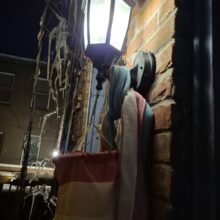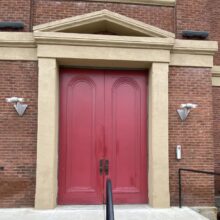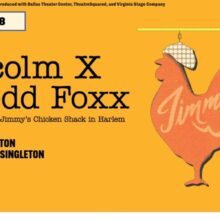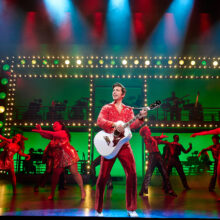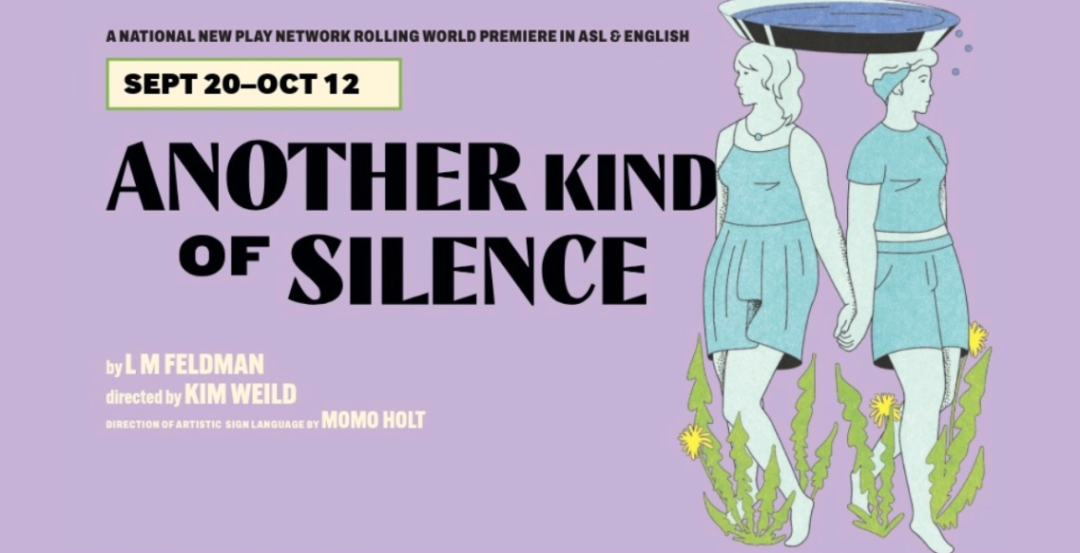
Oh, did I mention I’m taking a class in theater reviews? The first lesson is to write about what you know. I know lesbians better than anything else in this production – better than ASL, Greece, mythology, or being an ex-pat. I didn’t learn anything new about lesbians, but I learned a lot about the other things. And I would be remiss if I didn’t mention this is a queer love story because fluidity is practically dripping from the stage. It is not a lesbian story. Thank God.
Being part of a creative ‘first’ is a rare experience, even a bit heady. Pittsburgh’s City Theatre first new work of the season gives us this opportunity to experience and understand deaf culture through an immersive queer love story. Or perhaps to understand queer love through deaf culture. The play is titled Another Kind of Silence.
The play’s storylike is rather typical girl meets girl, both are in longish relationships, both pine for each other, eventually being forced to confront that desire and consider its implication. From Carol to every season of The L Word, this is a perpetual theme.
Ana (Jules Dameron) who is deaf and apparently nonbinary works alongside their partner Chap (Kaia Fitgerald) who is hard of hearing and queer. They communicate using American Sign Language, although it is noted that Ana is fluent in six languages and does occasionally lapse into Greek Sign Language on stage.
Evan (Catherine Gowl) and her husband Peter(Anil Margsahayam) are both hearing. She’s a writer/professor. He’s a classical music composer and director sought after around the world. Neither is seemingly proficient or even rudimentary in ASL. Or either spoken Greek or Greek Sign Language. It doesn’t seem like they are queer at the outset.
Evan and Chap meet one day by happenstance. There’s a spark and an emotional affair soon follows. They are considering blowing up their lives for desire.
And the playwright added four additional characters to serve as a Greek chorus for each of these humans, four characters signing sometimes speaking while following their human around, offering comfort, pointing out their inner truths. They are garbed in these flowing Greek mythology gowns each in a primary color that subtly reflects their human – Ana’s subtle green clothing is paired with a chorus who wear a flowing gorgeous lime set reinforcing their otherwordliness as well as their perspective.
And there are captions and transcripts and subtitles projected onto the pillars looming over the set, high enough to be read from the seats in the back yet timed enough with the spoken English and ASL to feel a natural part of the dialogue. So this play is in three language – English, ASL, and GSL. Plus, the written component.
Set in Athens, the stage is pillared with heavy stone moving from the cafe to the Acropolis to the seashore. A large moving circle in the middle of the stage reflects the passage of time and distance.
The immersion is intense, overwhelming, and a bit befuddling. I was constantly trying to get my bearings as the three communication styles unfolded, sometimes just one sometimes all three. It was impossible to ‘just’ listen to the spoken parts because the deaf actors are really good at drawing attention and speaking their minds and adding a layer to the narrative that I’ve never experienced before. Deaf culture communication is more than the signing, it is the expressions and body language and its own unique grammar.
The collision of deaf culture with hearing culture unfolding on the stage in language, relationships, and desire was mesmerizing. There was a symbiosis from the preparation of the show that felt awkward and off-kilter precisely because we rarely strive for symbiosis with deaf culture. Ever.
It did not make me want to go to Greece, but it did make me curious about returning to ASL classes.
The actors were amazing, a dizzying intricate always moving flow of eight humans. Some only signed, others only spoke, while several did both.
What I didn’t love were the unspoken but essential pieces of information. Chap is a brilliant artist who has filled the cafe with her creations and infused her food creations with that passion. But suddenly she’s pouring out her artistic block to this stranger, I think because her experience in deaf culture makes her more attuned to that stranger – Evan -struggle to write? But the leap from happy couple creating and loving in Athens to acting on an unexpected desire because of her art is just not believable. Or well-explained.
Chap is not a particularly likable character – she wants people to be who she wants them to be. She demands her partner Ana not sign in Greek or seemingly any other language, denying them expression or rejecting a part of them. Chap demands Evan respond to her cooking in a ver specific way, acting out a fantasy that Evan indulges. Chap never asks Evan about anything in her life but her novel, assuming she is unfulfilled by her teaching or her connection to music. Chap is drawn to Evan because she can speak with her – Chap is hard of hearing but assistive technology allows her to engage the hearing world.
Evan also is not a likable character. She’s intrigued by Chap’s art, but shows no interest in her deaf culture. Evan’s husband was once a promising young artist as was Evan herself. Unlike Chap, Evan did not run off around the world embracing an ex-pat lifestyle that seemingly landed her in an enviable lifestyle. Evan seems to make it her mid-life crisis choice to do so. Or contemplate regardless of the consequences.
I just did not sense any chemistry between the characters. I was not invested in their connection, more curious what they were running from. Evan felt petulant and as I said Chap’s motivations remained unclear. Other than perhaps living in the shadows of their respective accomplished partners, there was little in common. Evan also felt a little predatorial, using the young woman’s obvious infatuation to fuel her writing and playing along with Chap’s demands to keep that fuel flowing.
There was a recurring reference to the myth of Orpheus and Eurydice that also felt a little forced. And while we saw passionate encounters between the various sets of lovers, there was no such encounter between Evan and her husband, exchanged of words, yes. He seemed devoted to her and willing to work it out. Orpheus and Eurydice did not apply well in my opinion.
Evan poses the interesting idea that we never know Eurydice’s thoughts or experiences. It is all about him. But Peter doesn’t seem like a bad guy or one who mistrusts, just befuddled. Evan was also no great Greek tragic figure so I’m still puzzling out that analogy.
The ending is satisfying because it fits the probable intended storylines with my interpretation of them.
My sympathies and interest were with Ana and Peter, the lovers on the outside, rather than the coupled centered as some great representation of unfulfilled desire.
I would be remiss not to give props to the four chorus actors – Hope Anthony, Thomas DellaMonica, Amelia Hensley, and Monique Holt. All four were absolutely riveting – Hensley just ruled the stage, leaving no doubt about what they were saying regardless of your familiarity with ASL. Holt pulls double duty on stage and off as the Director of ASL.
Hope Anthony agreed to contribute to the Seven with Sue Q&A series so I’m looking forward to their responses.
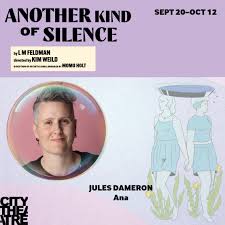
If I had to choose standout performances, I would say Hensley and Dameron, hands down. Both commanded the stage with equal parts intensity and subtlety.
Unpacking a show such as this is difficult with the constraint of a blog post. I’ve watched the promotional videos, the interviews, I’ve read up on the actors and crew. If I had time, I would go see this again. And maybe again.
When the show started, it did feel a little woo woo at first because it was unfamiliar. A couple behind us got up and left right away with some mumbling about lesbians and trans people. Shame on them. What did they expect? Did they read the play description? A bit later, some other people left because it was “hard to follow, tell me what happens” the bon motte wanna-be they tossed to others as they disrupted the fucking show for everyone to escape the queerness or the deafness. Or both?
In conclusion, we do need more groundbreaking art to help us navigate this narrow ugly world. We need to know the languages we speak, the ways we communicate, and and how to shift our perspective when we engage others. It may be heretical to say this lesbian blogger did not especially find the ‘lesbian’ love story that interesting as much as did the framework, the conceptualization, and the very challenge to push my own boundaries.
Now I’d like a sequel where Ana and Evan’s chorus have an intense conversation across dimensions while Peter plays softly in the background.
Up next at City Theatre is Little Women with a twist, paralling the author’s life with the book. I was so crushed they didn’t finish the Christmas at Pemberly cycle this year. And Greta Gerwig’s take on this classic just a few years after a brilliant turn from Masterpiece Theater leaves me wondering if this could be radical again in a new way?
But I’ll be there because live theater and all of the arts need us to show up and (re)think.
I hope this production has a successful run after it leaves Pittsburgh and perhaps returns one day.


